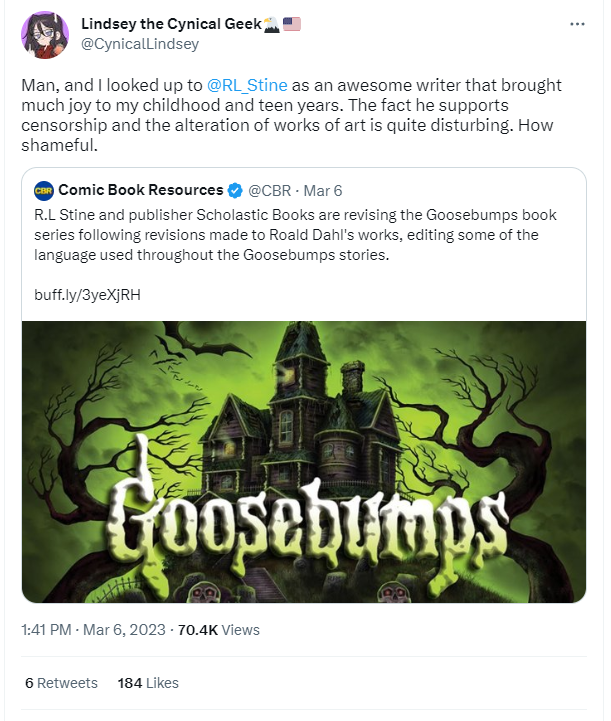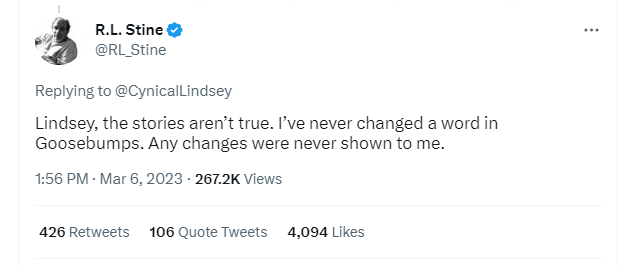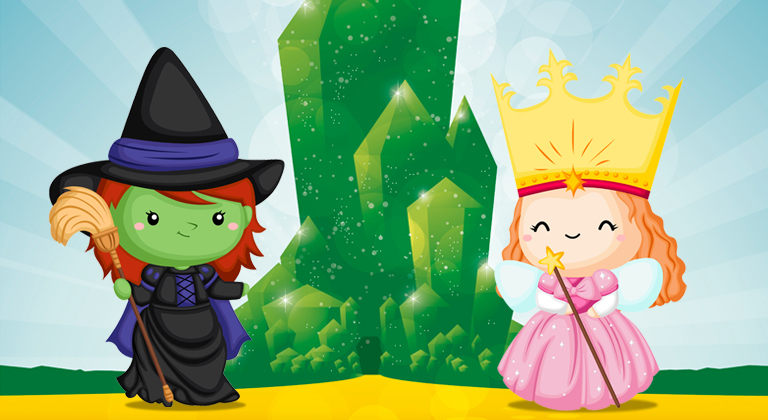R.L. Stine reveals that publishers are censoring books behind authors’ backs
If anyone reading this is still on the fence about whether or not traditional publishing is the way to go, moves like this might help your decision. It’s bad enough when a publisher censors the words of an author that is no longer around to complain or argue against those changes, but it’s even worse to do it to an author that is still alive and then not even tell them about it.
That’s exactly what happened to R.L. Stine, author of the beloved Goosebumps series. As Ginger relates below, Stine only found out that his publisher had changed language in his books when he started getting the blame for it on social media from upset fans. Stine was left to defend himself, with his publisher essentially hanging him out to dry.
Authors that are concerned about censorship should be aware that unless they are self-published, they’re likely at the mercy of their publishers when it comes to decisions about whether or not the language in their books are appropriate for the times.
Recently, I wrote about how Ian Fleming Publications and Penguin Random House had both attempted to censor the words of celebrated authors to appease a more “sensitive” modern audience – removing words and phrases that panels of readers had warned could cause offense.
In the case of both Ian Fleming and Penguin author Roald Dahl, the writers themselves are no longer alive to defend their work – leading to Ian Fleming Publications even having the audacity to claim “this is something Ian Fleming would have wanted.” Many of us are skeptical of that!
At least Penguin were gracious enough not to mirror that claim – perhaps because, in Roald Dahl’s case, the author himself had posthumously warned his publishers not to “change one word” of his books or he’d never write for them again.
But apparently it’s not just deceased authors whose books are being re-written. 79-year-old author R. L. Stine, the creator of the beloved Goosebumps series, recently found out that his publisher had made over 100 edits to his books prior to re-publication – and hadn’t even made him aware of the fact!
Initial reports about changes to the Goosebump series claimed that R.L. Stine had approved the changes, but he took to Twitter to refute that, as demonstrated below:
This has now led to many of us wondering if there’s anything publishers will consider sacred! To censor the words of a dead author is bad enough, but to censor the words of a writer who’s still alive seems beyond despicable!
Adding insult to injury, the changes being made are as difficult for many of us to understand as the edits to the Roald Dahl books. They include changing words like “plump” to “cheerful” and “crazy” to “silly.” Characters who were “overweight” are now “huge” and one character described as African-American (which seems a completely appropriate description even today) is now described as simply having “brown skin” – which instantly removes a lot of the context which could have helped us recreate him in our mind the way R.L. Stine originally envisioned.
Much like the changes made to the Roald Dahl books, the real problem with editing the Goosebumps books is that they were largely inoffensive to begin with. Ian Fleming’s James Bond books at least had the thorny topic of race to discuss, whereas R.L. Stine’s books have always been aimed towards a young audience and have generally used fairly gentle language and empathetic terms to discuss thorny topics. The books are scary, sure – but it’s the monsters who make them that way, not the adjectives.
When initially announcing the changes, Stine’s publisher Scholastic made a statement in which they claimed: “Scholastic reviewed the text to keep the language current and avoid imagery that could negatively impact a young person’s view of themselves today, with a particular focus on mental health.”
However, they didn’t explain why these changes had been made without R.L. Stine’s permission (or, in fact, even his knowledge!) Neither did they defend him when people on Twitter criticized the author for making the changes. As I’ve complained about before, it’s another example of a traditional publishers failing to support their authors.
What makes it especially egregious to me, though, is what an active and important figure R.L. Stine is – representing not just Scholastic, but also the young readers who devour his books. Even as he approaches 80, R.L. Stine travels all over America to connect with younger readers through school events and appearances, and for many of these kids he’s the first “real” author they ever get to interact with. It’s disheartening to see Scholastic treat Stine so poorly, since he represents everything the publishing company claims to represent.
I mean, let’s be honest. R.L. Stine is, in many ways, the G.O.A.T. He’s Stephen King for pre-teens. I’ve never failed to be astonished at the impact the Goosebumps series has had on America.
I first learned about Goosebumps when I moved to America 20 years ago. My wife (who is the same age as I am) told me about these incredible books which chilled her to the bone, and yet infected her with a love of reading. Yet today, I also find kids feverishly discussing the same books as they wait alongside my pre-teens for the bus.
Goosebumps has become this cultural beacon through which three generations can connect with each other through a shared reading experience – and that connection gets broken when publishers screw around with the language.
Once again, it’s impossible to know whether or not Scholastic will reverse their decision to edit R.L. Stine’s words. One thing is certain, however: The war against censorship continues, and it looks like our backs are against the wall.














Publishers have always done this type of stuff but it happened mainly BEFORE publication. I was a trade author for years and minority authors went through this all the time. They always wanted to whitewash our books, change our characters, and make our stories more “white” so they could appeal to a “mainstream audience” because trade publishing’s misguided and racist view is that “white” people are the only ones who read or white people won’t read books with people other than themselves, which is an offensive thing toward white people and minorities. It’s also only ONE example of publishers not knowing what readers want but always acting as they do. Unlike self-publishing, trade pubs don’t talk to readers. They don’t engage with the reader or their market. They talk to booksellers and librarians, not the main chunk of the audience buying books. Had they ever done that they would be more knowledgeable and not assume they know more about what readers want than readers. That is the prime example of publishers’ arrogance. They’ve always thought they knew more than anyone else about readers when they really don’t know anything. They need to study the indie side because indie publishing has left them miles ahead in terms of trends, pricing, engaging readers, being artistic, being authentic, etc.
But, yeah, I hope this doesn’t surprise anyone. Pubs have always been sneaky and they care only about themselves, not the author. They will do anything to your book to either make more money or to cover their butts. They don’t care if it infringes on an author’s creativity or their words. You hear all this crap about “Pubs care about books.” Not anymore. They USED to. Publishers and editors in trade USED to care about books but now it’s money. The old publishing days are gone. You don’t have those dedicated editors who fought for authors like back in the day. Many pubs now have so much turnover that an author’s book is doomed before publication. It used to be you were stuck with the editor who signed your book and loved it. Now? They offer you a contract if they feel it can make money, they don’t even have to like the books now. The writer could be a machine and they wouldn’t care if you end up spitting out the next Twilight.
So, for the newbies thinking this is like the 90s when pubs nurtured an author’s career, HA. Those days are gone. More than before you are nothing but a number and there is no more nurturing. If your book doesn’t make a certain amount of money quickly, you are either dropped or thrown at the bottom of the heap where you get no publicity, no bookstore/library placement and no push.
I do hope newbies who want to go into publishing read this but I find so many of them who wanna go trade still have those delusions of grandeur. They still look down on being indie and think if they just buckle down, be patient, and search for an agent for 10+ years, they will finally get a deal. It is a million times harder to get published by a big house today than even 5 years ago. And most likely you will be midlist or lower midlist and making no money.
It is infuriating how money has taken over publishing and ruined it. So of course, they care less about creativity than before and it’s sad. But again, this is business now. I advise any author to go indie. Even if you don’t have money there are ways. The trade-publishing machine is NOT your friend and censoring, whitewashing, etc. is only a tiny tip of the underhanded stuff they do.
As for censoring, I’ve never seen a reader who wants that. A story is a story. It’s FICTION and the author should be free to express themselves for the sake of the story.
Newbies better pay attention. Who knows how the trade-publishing world will look 5 years from now because it looks pathetic now, but if you want to be ahead of the curve and actually be able to control your own destiny (at least to a point) then trade publishing is not for you.
thank you for your comments. Just as I thought I gave up querying too early (after two months last year), I read this, and I feel better. Writing can be so disheartening, whether indie or not, but at least if I get thrown under the bus, it’s ME doing it.